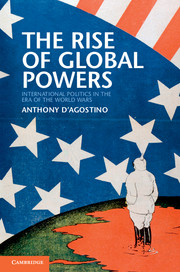Book contents
- Frontmatter
- Contents
- Maps
- Acknowledgements
- Introduction
- 1 The great powers at the dawn of world politics
- 2 Global origins of World War I: from the China scramble to the world crisis of 1904–1906
- 3 Global origins of World War I: a chain of revolutionary events across the world island
- 4 Balance and revolution, 1914–1918
- 5 A ragged peace, 1919
- 6 Scramble for Eurasia, 1919–1922
- 7 Drastic acts of unhappy powers, 1922–1923
- 8 Storms in the lull, 1924–1927
- 9 Politics and economics of the great slump, 1928–1933
- 10 A vogue for national economy
- 11 Mussolini’s moment, 1933–1935
- 12 The global civil war, 1936–1937
- 13 Last years of peace, 1937–1939
- 14 The European war, 1939–1941
- 15 The world war
- 16 Balance and hegemony
- Maps
- Notes
- Index
15 - The world war
Published online by Cambridge University Press: 05 June 2012
- Frontmatter
- Contents
- Maps
- Acknowledgements
- Introduction
- 1 The great powers at the dawn of world politics
- 2 Global origins of World War I: from the China scramble to the world crisis of 1904–1906
- 3 Global origins of World War I: a chain of revolutionary events across the world island
- 4 Balance and revolution, 1914–1918
- 5 A ragged peace, 1919
- 6 Scramble for Eurasia, 1919–1922
- 7 Drastic acts of unhappy powers, 1922–1923
- 8 Storms in the lull, 1924–1927
- 9 Politics and economics of the great slump, 1928–1933
- 10 A vogue for national economy
- 11 Mussolini’s moment, 1933–1935
- 12 The global civil war, 1936–1937
- 13 Last years of peace, 1937–1939
- 14 The European war, 1939–1941
- 15 The world war
- 16 Balance and hegemony
- Maps
- Notes
- Index
Summary
Discourse about the balance of power is usually conducted by reference to what historian Paul Kennedy has called the “neo-mercantilist calculus of national power,” that is, largely in terms of heavy industry and the munitioning potential of national economies. This would seem to be ABC. Viewed historically, however, the balance of power in a given period should also take into account what might be called the balance of ideas. Great states have risen to prominence as a result of economic growth and decisions by their leaders to project power in encounters with other states. But states have also at the same time ridden ideas to the top of the order. Britain rose to greatness among the European states as the champion of the Reformation, at least according to the celebrated historian James Froude. For him Francis Drake was no mere pirate but a soldier of the faith in combat with the papacy and Catholic Spain and France. Germany’s rise to power in the nineteenth century reflected the rise of German industries and proven military prowess, but it also thought it represented the new scientific rationality and its own idea of the modern state as a law unto itself. It rejected the pretensions of liberalism and individualism as a cloak behind which the cynical British had established world supremacy. Soviet power rose up in the twentieth century proclaiming itself the vehicle of socialism and anti-imperialism. The United States has claimed to speak for liberal democracy. The balance of power has been repeatedly shaken by some new revolutionary idea personified in the rise of a new state. The historian has to take note of the theme of revolution intruding on the theme of imperial expansion and the calculus of national power.
In World War I the theme of revolution began to intrude on the calculations of a balance-of-power war among the great imperial powers at about the time, in 1915–16, when the ammunition ran out and the powers realized they were in a struggle for their very existence. We have seen their attempts to make an ally of revolution, by means, for example, of Irish nationalism, Bolshevism, the East European revolution, and jihad. Things came to this again in the European war of 1939–41, when the British dropped leaflets from planes urging a struggle against the bestial philosophy of fascism, when Mussolini issued a call to rebellion in the Middle East against British imperialism, and when the Japanese moved against the French empire and called for a New Order according to the ideology of Asianism. The point of no return for the old empires was the entry into the war of the Soviet Union and the United States.
- Type
- Chapter
- Information
- The Rise of Global PowersInternational Politics in the Era of the World Wars, pp. 423 - 466Publisher: Cambridge University PressPrint publication year: 2011



